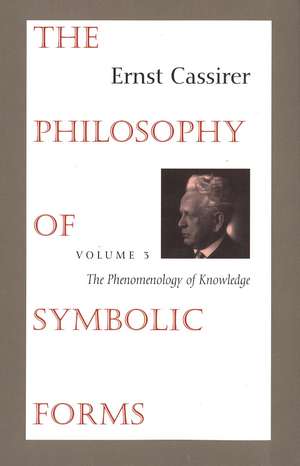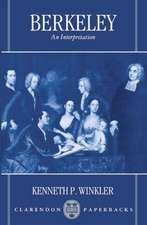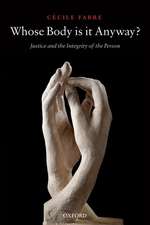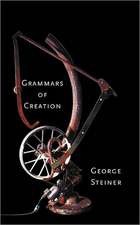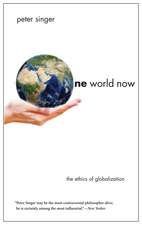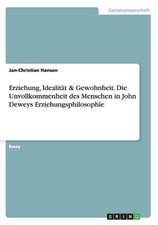The Philosophy of Symbolic Forms: Volume 3: The Phenomenology of Knowledge
Autor Ernst Cassirer Traducere de Ralph Manheim Contribuţii de Charles W. Hendelen Limba Engleză Paperback – 10 sep 1965
The Symbolic Forms has long been considered the greatest of Cassirer’s works. Into it he poured all the resources of his vast learning about language and myth, religion, art, and science—the various creative symbolizing activities and constructions through which man has expressed himself and given intelligible objective form to this experience.
“These three volumes alone (apart from Cassirer’s other papers and books) make an outstanding contribution to epistemology and to the human power of abstraction. It is rather as if ‘The Golden Bough’ had been written in philosophical rather than in historical terms.”—F.I.G. Rawlins, Nature
“These three volumes alone (apart from Cassirer’s other papers and books) make an outstanding contribution to epistemology and to the human power of abstraction. It is rather as if ‘The Golden Bough’ had been written in philosophical rather than in historical terms.”—F.I.G. Rawlins, Nature
| Toate formatele și edițiile | Preț | Express |
|---|---|---|
| Paperback (4) | 282.10 lei 3-5 săpt. | |
| Yale University Press – 30 iun 1977 | 282.10 lei 3-5 săpt. | |
| Yale University Press – 21 ian 1998 | 287.32 lei 6-8 săpt. | |
| Yale University Press – 10 sep 1965 | 374.70 lei 6-8 săpt. | |
| Yale University Press – 10 sep 1965 | 480.78 lei 6-8 săpt. | |
| Hardback (1) | 1026.99 lei 6-8 săpt. | |
| Taylor & Francis – 25 sep 2020 | 1026.99 lei 6-8 săpt. |
Preț: 480.78 lei
Nou
Puncte Express: 721
Preț estimativ în valută:
92.04€ • 95.81$ • 75.77£
92.04€ • 95.81$ • 75.77£
Carte tipărită la comandă
Livrare economică 01-15 februarie 25
Preluare comenzi: 021 569.72.76
Specificații
ISBN-13: 9780300000399
ISBN-10: 0300000391
Pagini: 528
Dimensiuni: 127 x 203 x 36 mm
Greutate: 0.66 kg
Editura: Yale University Press
Colecția Yale University Press
ISBN-10: 0300000391
Pagini: 528
Dimensiuni: 127 x 203 x 36 mm
Greutate: 0.66 kg
Editura: Yale University Press
Colecția Yale University Press
Cuprins
Volume 1: Language
Foreword Peter E. Gordon Translator’s Preface S. G. Lofts Translator’s Introduction: The Question Concerning the Human – Life, Form, and Freedom: On the Way to an Open Cosmopolitanism S. G. Lofts Translator’s Acknowledgements S. G. Lofts Preface Introduction and the Framing of the Problem 1. The Problem of Language in the History of Philosophy 2. Language in the Phase of Sensible Expression 3. Language in the Phase of Intuitive Expression 4. Language as the Expression of Conceptual Thinking – The Form of the Linguistic Formation of Concept and Class 5. Language and the Expression of the Pure Forms of Relation – The Sphere of Judgment and the Concepts of Relation [Relation]. Glossary of Terms Index of Proper Names General Index.
Volume 2: Mythical Thinking
Foreword Peter E. Gordon Translator’s Preface S. G. Lofts Translator’s Introduction: A Transcendental Critique of Mythical-Religious Consciousness – Identity Thinking, the Natural Attitude, and an Immanence in the Sacred Sense of Life S. G. Lofts Translator’s Acknowledgements S. G. Lofts. Preface Introduction: The Problem of A "Philosophy of Mythology" Part 1: Myth as Thought-Form 1. The Character and Basic Tendency of Mythical Object Consciousness 2. The Individual Categories of Mythical Thinking Part 2: Myth as Form of Intuition – The Construction and Organization of the Spatial-Temporal World in Mythical Consciousness 1. The Basic Opposition 2. The Basic Features of a Morphology of Myth – Space, Time, and Number Part 3: Myth as Life-Form – The Discovery and Determination of Subjective Reality in Mythical Consciousness 1. The I and the Soul 2. The Forming Emergence of the Feeling of Self from the Mythical Feeling of Unity and Life 3. Cult and Sacrifice Part 4: The Dialectic of Mythical Consciousness. Glossary General Index Index of Proper Names.
Volume 3: Phenomenology of Cognition
Foreword Peter E. Gordon Translator’s Preface S. G. Lofts Translator’s Introduction: A Phenomenology of Symbolic Creative Cognition – the Unfolding of the Symbolic Function and the Construction of a Pure Theory of the Symbolic S. G. Lofts Translator’s Acknowledgements S. G. Lofts. Preface Introduction Part 1: The Expressive Function and the World of Expression 1. Subjective and Objective Analysis 2. The Expressive Phenomenon as the Basic Element of Perceptual Consciousness 3. The Expressive Function and the Mind-Body-Problem Part 2: The Problem of Representation [Repräsentation] and the Construction of the Intuitive World 1. The Concept and the Problem of Representation [Repräsentation] 2. Thing and Property 3. Space 4. The Intuition of Time 5. Symbolic Pregnance 6. Toward the Pathology of Symbolic Consciousness Part 3: The Function of Signification and the Construction of Scientific Cognition 1. Toward a Theory of the Concept 2. Concept and Object 3. Language and Science – Thing Signs and Ordinal Signs 4. The Object of Mathematics 5. The Foundations of Natural Scientific Cognition Appendix: "Spirit" and "Life" in Contemporary Philosophy (1930). Glossary General Index Index of Proper Names.
Foreword Peter E. Gordon Translator’s Preface S. G. Lofts Translator’s Introduction: The Question Concerning the Human – Life, Form, and Freedom: On the Way to an Open Cosmopolitanism S. G. Lofts Translator’s Acknowledgements S. G. Lofts Preface Introduction and the Framing of the Problem 1. The Problem of Language in the History of Philosophy 2. Language in the Phase of Sensible Expression 3. Language in the Phase of Intuitive Expression 4. Language as the Expression of Conceptual Thinking – The Form of the Linguistic Formation of Concept and Class 5. Language and the Expression of the Pure Forms of Relation – The Sphere of Judgment and the Concepts of Relation [Relation]. Glossary of Terms Index of Proper Names General Index.
Volume 2: Mythical Thinking
Foreword Peter E. Gordon Translator’s Preface S. G. Lofts Translator’s Introduction: A Transcendental Critique of Mythical-Religious Consciousness – Identity Thinking, the Natural Attitude, and an Immanence in the Sacred Sense of Life S. G. Lofts Translator’s Acknowledgements S. G. Lofts. Preface Introduction: The Problem of A "Philosophy of Mythology" Part 1: Myth as Thought-Form 1. The Character and Basic Tendency of Mythical Object Consciousness 2. The Individual Categories of Mythical Thinking Part 2: Myth as Form of Intuition – The Construction and Organization of the Spatial-Temporal World in Mythical Consciousness 1. The Basic Opposition 2. The Basic Features of a Morphology of Myth – Space, Time, and Number Part 3: Myth as Life-Form – The Discovery and Determination of Subjective Reality in Mythical Consciousness 1. The I and the Soul 2. The Forming Emergence of the Feeling of Self from the Mythical Feeling of Unity and Life 3. Cult and Sacrifice Part 4: The Dialectic of Mythical Consciousness. Glossary General Index Index of Proper Names.
Volume 3: Phenomenology of Cognition
Foreword Peter E. Gordon Translator’s Preface S. G. Lofts Translator’s Introduction: A Phenomenology of Symbolic Creative Cognition – the Unfolding of the Symbolic Function and the Construction of a Pure Theory of the Symbolic S. G. Lofts Translator’s Acknowledgements S. G. Lofts. Preface Introduction Part 1: The Expressive Function and the World of Expression 1. Subjective and Objective Analysis 2. The Expressive Phenomenon as the Basic Element of Perceptual Consciousness 3. The Expressive Function and the Mind-Body-Problem Part 2: The Problem of Representation [Repräsentation] and the Construction of the Intuitive World 1. The Concept and the Problem of Representation [Repräsentation] 2. Thing and Property 3. Space 4. The Intuition of Time 5. Symbolic Pregnance 6. Toward the Pathology of Symbolic Consciousness Part 3: The Function of Signification and the Construction of Scientific Cognition 1. Toward a Theory of the Concept 2. Concept and Object 3. Language and Science – Thing Signs and Ordinal Signs 4. The Object of Mathematics 5. The Foundations of Natural Scientific Cognition Appendix: "Spirit" and "Life" in Contemporary Philosophy (1930). Glossary General Index Index of Proper Names.
Recenzii
'The three volumes of The Philosophy of Symbolic Forms focus on language, myth, and science respectively, offering fascinating, if necessarily fragmentary and speculative, accounts of how each develops in the direction of increasing freedom and universality… the basic insight of The Philosophy of Symbolic Forms is one that continues to inform the humanities today. The categories we use to understand the world aren’t a passive reflection of the way things really are; rather, we actively create systems of meaning that evolve over time.' - Adam Kirsch, New York Review of Books
Notă biografică
Ernst Cassirer was born in Germany 1874 in the city of Breslau (now Wroclaw, Poland). He taught at Hamburg University from 1919 to 1933, and then at All Souls College, Oxford, before emigrating to Sweden and then to the United States. Through its creative interpretation of Kant’s philosophy combined with a deep knowledge of the role of language and culture, Cassirer’s work is regarded as indispensable to understanding the relationship between the two major traditions in twentieth-century philosophy, the ‘analytic’ and the ‘continental’. Cassirer’s philosophy is unique, as it sought a common ground between the scientific and humanistic worldviews which frequently divided these two traditions, exemplified in his famous debate with Martin Heidegger at Davos in 1929. His work resulted in the monumental Philosophy of Symbolic Forms as well as several books on the philosophy of humanism and the Enlightenment. He taught at the universities of Yale and Columbia in the early 1940s and died in New York in 1945.
Steve G. Lofts is Professor of Philosophy at King’s University College, Canada. He is the translator of Cassirer’s The Logic of the Cultural Sciences and The Warburg Years (1919-1933): Essays on Language, Art, Myth, and Technology.
Steve G. Lofts is Professor of Philosophy at King’s University College, Canada. He is the translator of Cassirer’s The Logic of the Cultural Sciences and The Warburg Years (1919-1933): Essays on Language, Art, Myth, and Technology.
Descriere
Descriere de la o altă ediție sau format:
Ernst Cassirer occupies a unique space in Twentieth-century philosophy, and The Philosophy of Symbolic Forms is his most important work. This major new translation of all three volumes, the first for over fifty years, brings Cassirer's magnum opus to a new generation of students and scholars.
Ernst Cassirer occupies a unique space in Twentieth-century philosophy, and The Philosophy of Symbolic Forms is his most important work. This major new translation of all three volumes, the first for over fifty years, brings Cassirer's magnum opus to a new generation of students and scholars.
